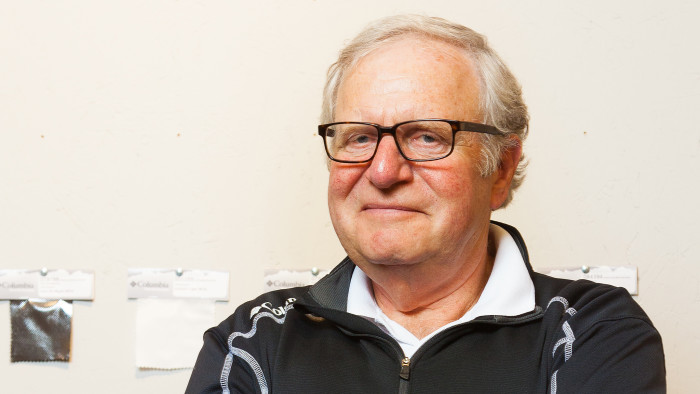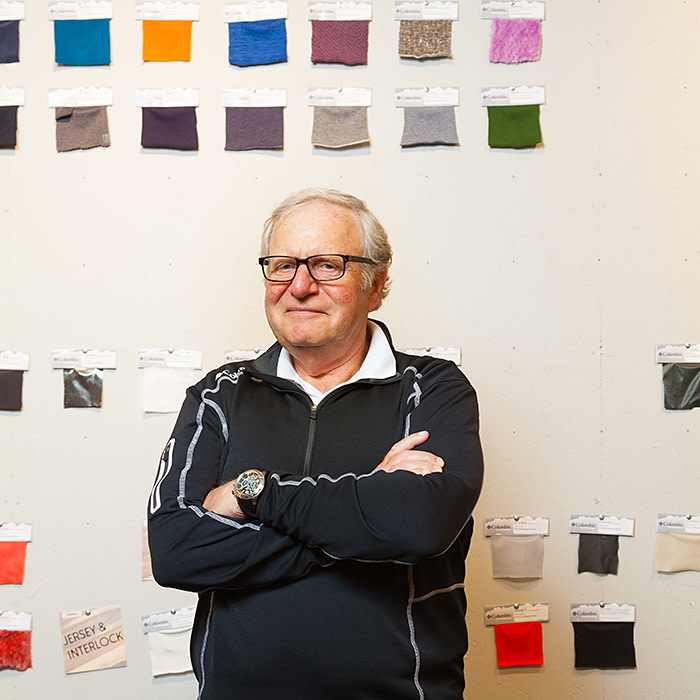Tim Boyle of Columbia Sportswear on US immigration policy: ‘I think it’s just a travesty what’s happening’

Roula Khalaf, Editor of the FT, selects her favourite stories in this weekly newsletter.

For a billionaire, Tim Boyle is as down to earth as the products he sells.
Yes, the president and chief executive officer of Columbia Sportswear Company owns a private jet, used mostly for business. But Boyle spends off hours fishing, skiing and hiking. He wears windbreakers and fleeces designed at the $6.5bn Nasdaq-listed outerwear giant’s headquarters in rainy Oregon, down the road from Nike Inc.
At 69, the avid golfer also enjoys hunting. But Boyle shoots birds instead of the big game bagged by the sons of President Donald Trump, a man whose policies on trade and immigration he abhors.
No one could have imagined Columbia’s spectacular rise in 1970, when Boyle hurried home from university upon his father’s death to help his mother save the family business. Gert Boyle had raised her son to appreciate America as a nation of immigrants that had accepted her as a 13 year old fleeing Nazi Germany. She had gumption, but no experience running an enterprise that, at the time, had 40 employees and $800,000 in sales. “It wasn’t as discouraging as it would have been had I known anything,” Boyle says of Columbia’s outlook then. “I just didn’t realise how daunting a task it was going to be.”
Together the housewife and the graduating college student narrowly averted bankruptcy, saving the company that listed their home as collateral. Instead of selling the venture after the bank demanded repayment, they shed employees and trimmed products to offer only items unique to Columbia.
“Once we found the points of differentiation for the business, things got much easier,” Boyle says. “Even today, we have to occasionally go back and say, ‘Okay, let’s refocus our product offering. We’re too broad.’”
The bank relented, extending the line of credit for the company, which, like Nike in its early days, got financial backing from Japan. Columbia’s sales rose during the 1970s as Americans favoured more casual office attire and embraced outdoor activities.
Ultimately, Columbia grew into a $6.5bn public company, where at 94, Gert Boyle still works each day. Annual net sales hit a record $2.47bn last year.
Given his record of overcoming adversity, Boyle tends to jump in when he sees a problem, inside or outside the company.
A year ago, he threatened to pull the headquarters for the company’s footwear brand, Sorel, out of the centre of Portland, citing street people who menaced employees. In a local newspaper article, Boyle did not refer specifically to homeless people, but critics drew that inference.
The controversy prompted soul-searching among business and community leaders. In April, Boyle offered to donate $1.5m to help build a 100-bed homeless shelter on land to be provided by the city of Portland.
“We’re trying to attract more employees to the city, to our place of business,” Boyle said at the time, “and that’s why I’ve decided it’s important to invest in the project.” The city should be safe and liveable for everybody, he said.
Boyle opened his wallet again in June, saying that litter on the motorways created a bad impression for potential Columbia employees travelling between Portland’s airport and its company headquarters.
Oregon’s roads should be as clean and green as the state’s image, Boyle said. He opened a fundraising drive to clear up litter, starting with $146,000 that he offered to state officials.
“They were flabbergasted,” says Boyle, who was told that the state transportation agency had no mechanism for accepting private money. “It took them months to figure out how they could consider doing that.”
As bureaucrats dithered, rubbish kept accumulating. The shelter project also failed to open in November as sponsors had promised. The site turned out to be contaminated and needed an expensive clean up. The project now looks more likely to open next year, leaving Portland’s homeless exposed to another winter.
Boyle, a registered Democrat, faulted city and state political leaders for failing to set priorities and get results. Labelling Oregon’s Democratic governor Kate Brown a poor manager, he backed her Republican opponent.
Yet Boyle reserves his most biting criticism for President Trump, blasting the Republican administration’s isolationist policies.
“Personally and from a business standpoint, you’re much richer if you interact with people of different cultures, different languages and different beliefs,” Boyle says. “It’s made America what it is today and the fact that it’s under siege is depressing.”
At a talk in June, at Portland’s FBI office, Boyle recounted his mother’s escape from Germany and told agents that his Irish grandfather probably immigrated illegally to the US.
“I think it’s just a travesty what’s happening,” Boyle said of Trump’s immigration policies. He said Trump calls some immigrants “animals” the way Adolf Hitler demonised Jews. Boyle has joined Nike chief executive Mark Parker in opposing administration-backed efforts to repeal Oregon’s sanctuary law, which limits local enforcement of federal immigration statutes.
Boyle also opposes Trump’s trade war with China, one of many countries where Columbia has been manufacturing and marketing products. Already, worldwide duties paid by the company average between 14 and 15 per cent.
Boyle expects Brexit to complicate distribution in Europe, where products sold in the UK are distributed from France. “Escalating global trade battles have the potential to be very disruptive to our business as well as our vendors, our customers and to many of the countries where we do business,” Boyle warned during an earnings call in July.
Amid the turbulence, Boyle is leaving nothing to chance. He orchestrated a management shake-up last year, resuming the role of company president, a position he had relinquished in 2015. He is pushing Columbia to expand its web-based sales to consumers, keeping a wary eye on the traditional retail sector, where some established brands, such as the Sports Authority, have gone under.
In the next five years, Boyle aims to make footwear the company’s fastest-growing and largest product category. His aim, he says, is to continue the international growth that he has led since Columbia went public 20 years ago as a wholesaler narrowly focused on winter products.
The proponent of free movement of goods and services says he has no intention of personally relocating for financial advantage. During quarterly meetings, Boyle says, his accountant advises him to leave Oregon because of its high income and estate taxes.
“He says, ‘I don’t want to be sued by your heirs,’” Boyle says.
But Boyle — who could readily jet back and forth from, say, Nevada, which has no estate taxes — demurs. He is too attached to his home state, where he likes skiing and playing rounds at Gearhart Golf Links, a coastal course that he has restored.
Boyle’s son and daughter both work at Columbia, where he is known to come in early and talk to employees. He and his wife Mary serve on boards and support charities in Oregon, where he helped restructure the public higher education system.
Boyle, modestly, says he has no plans to retire. “I enjoy what I’m doing,” he says. “Hopefully I do a reasonable job, although arguably many people could do it better than me.”
Comments